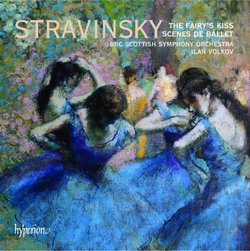| All Artists: Stravinsky, BBC Scottish So, Volkov Title: Fairy's Kiss / Scenes De Ballet Members Wishing: 0 Total Copies: 0 Label: Hyperion Original Release Date: 1/1/2010 Re-Release Date: 4/13/2010 Album Type: Import Genre: Classical Style: Symphonies Number of Discs: 1 SwapaCD Credits: 1 UPC: 034571176970 |
Search - Stravinsky, BBC Scottish So, Volkov :: Fairy's Kiss / Scenes De Ballet
 | Stravinsky, BBC Scottish So, Volkov Fairy's Kiss / Scenes De Ballet Genre: Classical
The second disc of Stravinsky s ballet music from the BBC Scottish Symphony Orchestra and Ilan Volkov features the composer s fascinating recreation of the music of Tchaikovsky and Adam. Stravinsky s advocation of the- the... more » |
Larger Image |
CD Details
Synopsis
Product Description
The second disc of Stravinsky s ballet music from the BBC Scottish Symphony Orchestra and Ilan Volkov features the composer s fascinating recreation of the music of Tchaikovsky and Adam. Stravinsky s advocation of the- then unfashionable music of
Tchaikovsky was well known: he was a public champion of the composer over the Russian nationalists such as Rimsky-Korsakov. In 1928, Stravinsky was commissioned by Ida Rubinstein to compose a ballet based on music by Tchaikovsky. Stravinsky probably envisaged a set of free orchestrations, but the music seems to have taken over and dictated its own terms, with the result that Stravinsky soon found himself entangled in an intricate recreative process, and having to compose day and night to get the work completed in time for the first performance. The result, The Fairy s Kiss, is a complex and highly original masterpiece that brilliantly challenges our perhaps too comfortable way of listening to late romantic music. Scènes de ballet is in its way another recreation a ballet after Giselle written for performance on Broadway in 1944. Stravinsky devised a semi-abstract scenario with vague allusions to Giselle among other nineteenth-century ballets. He then proceeded to compose, as it were, away from such models, to the extent that his music constantly suggests their ethos and formulae but always through a neo-classical prism and without direct quotation.
Tchaikovsky was well known: he was a public champion of the composer over the Russian nationalists such as Rimsky-Korsakov. In 1928, Stravinsky was commissioned by Ida Rubinstein to compose a ballet based on music by Tchaikovsky. Stravinsky probably envisaged a set of free orchestrations, but the music seems to have taken over and dictated its own terms, with the result that Stravinsky soon found himself entangled in an intricate recreative process, and having to compose day and night to get the work completed in time for the first performance. The result, The Fairy s Kiss, is a complex and highly original masterpiece that brilliantly challenges our perhaps too comfortable way of listening to late romantic music. Scènes de ballet is in its way another recreation a ballet after Giselle written for performance on Broadway in 1944. Stravinsky devised a semi-abstract scenario with vague allusions to Giselle among other nineteenth-century ballets. He then proceeded to compose, as it were, away from such models, to the extent that his music constantly suggests their ethos and formulae but always through a neo-classical prism and without direct quotation.

 Track Listings (15) - Disc #1
Track Listings (15) - Disc #1